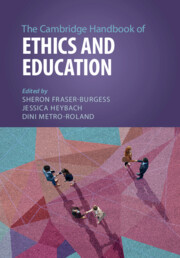Book contents
- The Cambridge Handbook of Ethics and Education
- The Cambridge Handbook of Ethics and Education
- Copyright page
- Epigraph
- Contents
- Figures
- Tables
- Contributors
- Foreword
- Preface
- Acknowledgments
- Part I Traditions in Ethics and Education
- 1 Ancient Chinese Ethics and Education
- 2 Ancient Greek and Roman Ethics and Education
- 3 Ubuntu Ethics and Education in Southern Africa
- 4 Ethical and Environmental Knowledge and Education
- 5 Ethics, Education, and the Inheritance of Abraham
- 6 Prioritizing Outcomes
- 7 Freedom and the Ethics of Educational Authority
- 8 Moral Education in the Virtues
- 9 The Ethics of Bildung and Liberal Education
- 10 American Pragmatism, Democratic Ethics, and Education
- 11 Radical Ethics
- 12 The Ethics of Phenomenology and Hermeneutics in Education
- 13 Feminist Ethics and the Contradictions of Gender
- 14 Postmodern/Poststructuralist Ethics and Education
- Part II Ethics and Education in Practice
- Part III Emerging Ethical Pathways and Frameworks
- Index
- References
14 - Postmodern/Poststructuralist Ethics and Education
from Part I - Traditions in Ethics and Education
Published online by Cambridge University Press: 07 March 2024
- The Cambridge Handbook of Ethics and Education
- The Cambridge Handbook of Ethics and Education
- Copyright page
- Epigraph
- Contents
- Figures
- Tables
- Contributors
- Foreword
- Preface
- Acknowledgments
- Part I Traditions in Ethics and Education
- 1 Ancient Chinese Ethics and Education
- 2 Ancient Greek and Roman Ethics and Education
- 3 Ubuntu Ethics and Education in Southern Africa
- 4 Ethical and Environmental Knowledge and Education
- 5 Ethics, Education, and the Inheritance of Abraham
- 6 Prioritizing Outcomes
- 7 Freedom and the Ethics of Educational Authority
- 8 Moral Education in the Virtues
- 9 The Ethics of Bildung and Liberal Education
- 10 American Pragmatism, Democratic Ethics, and Education
- 11 Radical Ethics
- 12 The Ethics of Phenomenology and Hermeneutics in Education
- 13 Feminist Ethics and the Contradictions of Gender
- 14 Postmodern/Poststructuralist Ethics and Education
- Part II Ethics and Education in Practice
- Part III Emerging Ethical Pathways and Frameworks
- Index
- References
Summary
This chapter tackles postmodern and poststructuralist outlooks on ethics and how these have impacted educational theory. To fulfill this task, the chapter indicates how such outlooks differ from other perspectives on the relationship of philosophy, education, and ethics. After some basic definitions, clarifications, disclaimers, and caveats that familiarize the reader with the related discourses and their challenges, the chapter shows how postmodern/poststructuralist basic assumptions beneath the corresponding ethics differ from other perspectives on (educational) normativity. Then the chapter discusses the distinction between the ethical and the moral that makes the impact of postmodern/poststructuralist ethics on educational theory most visible. It concludes with critical remarks on the current status of this impact and on the challenge of rethinking educational ethics “after post-isms”.
- Type
- Chapter
- Information
- The Cambridge Handbook of Ethics and Education , pp. 274 - 300Publisher: Cambridge University PressPrint publication year: 2024

